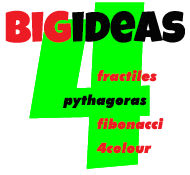MATHS GOSSiP
A mathematician is a machine for turning coffee into theorems. Alfréd Rényi
The biggest problem with the teaching of mathematics today is that it can be boring,
and have little meaning or interest for students. If you look at any maths book available for school children, the overwhelming thought would be dreary,
dull, repetitious, and well, just plain hard work.
Compounded with this, is the problem that most of the population will tell you that they hated maths at school and are no good at it even now.
MATHS DOES HAVE AN IMAGE PROBLEM
So what can we as teachers do about this, how can we encourage our students to have positive attitudes to maths and to think mathematically?
MATHEMATICAL GOSSIP of course.
Human beings are very good at gossip, it helps people in a group get to know each other, to find out intimate details and develop an understanding of other individuals. As soon as we know a little bit about someone our interest is aroused, we want to know a bit more and these understandings lead to an interest in one another and ultimately individuals in a group begin to care about each another.
THE BIG SECRET is that people who are good at maths are interested in it, they care about it, and they want to do it. Mathematicians 'gossip', or chat about numbers, and this is how their interest in things mathematical develops, our students can begin to develop this interest in just the same way.
Keith Devlin thesis in his wonderfully titled book, "The Math Gene - How Mathematical Thinking Evolved and Why Numbers are like Gossip",
is "that thinking mathematically is just a specialised form of using our language facility.
That mathematical ability is innate just like the innate ability to acquire and use language, in fact it is just a more specialised version of language.
So here we have it in a nutshell maths is like gossip, maths is language based, maths is discussion, sharing and developing of ideas and hypothesis.
This is because maths is not just about numbers, in fact arithmetic is just a small part of the study of mathematics, it is about ideas, relationships,
abstract thinking, cause and effect, logical reasoning as well as algorithms and numerical ability.
Real mathematical thinking comes from considering ideas and relationships,
from logic, from hypothesising, and these ideas need to be developed using language.
Language, discussion and collaboration give maths its meaning.
As with reading there are fundamental building blocks for mathematics, things like counting, addition, and multiplication facts.
But even these are really more interesting than phonics for heavens sake.
Pythagoras (565-545BC) would have been over the moon to have had the knowledge that any average primary school child has today.
In the BC days, maths was like the internet of today, there were wizards, magicians, and the truly gifted and talented.
There was a great buzz and excitement over new discoveries. People meet to discuss their latest maths ideas, and in fact this is still happening.
Paul Erdos was one of the most important mathematicians in the twentieth century.
"For more than 50 years, Erdos wandered the globe visiting mathematicians, attending meetings, teaching, and lecturing.
He had become the centre of an enormous web of collaboration.” He believed that Mathematics was a collaborative endeavour.
“A mathematician,” the Hungarian mathematician Alfréd Rényi (1921-1970) used to say, “is a machine for turning coffee into theorems.”
Rényi’s colleague Paul Erdős well embodied the statement.

It is through collaboration that the sense of discovery, the fun and excitement of mathematics, can be found in the early learning years of mathematics.
Collaboration teacher to teacher, student to teacher and student to student.
The rewards of effective discourse are many. Not long ago, I was observing students work out a problem together.
When they finally "got" it, one of the students exclaimed,
“WE ARE SO SMART."
Isn't that what we are striving for? Not "the teacher is so smart," not "they are so smart," but "we are."
In that statement, I heard both confidence and community.
Healthy discourse promotes these things. - Cynthia Lanius, Project Teacher
Encouraging Mathematical Thinking
WHAT QUESTIONS DO YOU ASK?
HOW DO YOU STIMULATE A TASK DISCUSSION?
HOW DO YOU ENCOURAGE MATHEMATICLA THINKING?
The Maths Forum, offers lots of splendid ideas for encouraging mathematical thinking, including various approaches,
leading and non-leading questions, paraphrasing summarizing, listening and assisting with decision making.
There are also video clip demonstrations as well.
But wait there's more, this site offers some excellent lesson plans for problems that stimulate mathematical thinking.
Also check out the Virtual Teacher Maths page for some splendid ideas.
The internet is a grrrrreat place to start discovering mathematical problems.
Working in groups students can have great fun 'gossiping' about maths, working out hypothesis, proving their theories and inventing solutions.
To help with these discussions a method of attack is useful. Here's one I often Use:-
MATHS ATTACK
Stage 1 - Brainstorm
1. How are we going to work this out?
2. What do we know?
3. What do we need to find out?
4. What strategies can we use to solve this problem.
Stage 2 - Solution
1. Use strategies discussed.
2. Discuss various outcomes.
3. Modify strategies if necessary.
4. Find a solution, and give reasons for your solution.
Stage 3 -Reflection
1. How well did we solve the problem?
2. Did the group keep on task?
3. Did everyone contribute?
4. How did you feel about your final answer?
Check out the Virtual Teacher Maths page, there are particularly great activities there.
.
WIZARD GAMES
Games to develop Mathematical Thinking -for the Wizards
Below are listed some links to mathematical games. These games are best played in groups of 2 or more, and students can discuss strategies,
and ideas in groups as well as with the whole class.
Matchstick Puzzles, Word Ladder Puzzles, Kicks Try them all
Mathematical Food for the Mind - For the Truly Gifted
Fractals - a fantastic area to invest age check
Marjorie Rice and of course Escher.
Here’s an intro on Fractals pdf
Number Gossip
Enter a number and I'll tell you everything you wanted to know about it
but were afraid to ask.
Download my book 4 Big Ideas that covers Fractals, Pythagoras Fibonaccia and 4 Colour theory
FAMOUS PROBLEMS
Famous Problems in the History of Mathematics
NRICH will be of particular interest to gifted and talented students. It covers the "The Bridges of Konigsberg",
"The Value of Pi", and many more, in simple language.
Problem of the Weekfrom NRICH
Create a mathematics buzz in your classroom. Celebrate original thinking and new discoveries.
Go beyond the multiplication tables and number facts and into the world of Mathematical Thinking.
Make friends of numbers, talk about them give them personalities, make jokes about them.
Talk and gossip about them with your students. Build a mathematical world that everyone is interested in and wants to be a part of.
Take a Look at the VT Maths Page for more ideas.
Oh! here's one to get you started.....
Do you need a Hammer to do Multiplication?
Find out the answer on page 44.
REFERENCES
Keith Devlin (2000) The Math Gene - How Mathematical Thinking Evolved and Why Numbers are like Gossip Weidenfield and Nicolson Great Britian
Paul Strathern (1997) The Big Idea Pythagoras and his Theorem Arrow Books United Kingdom
Paul Hoffman (1998) The Man Who Loved Only Numbers Hyperion NY USA
Cathy Brown (2000) Do you need a Hammer to do Multiplication?
Cathy Brown B.Ed. (HONS) is a Educator with over 30 years teaching experience from Pre-school to Tertiary level, she gives seminars and inservice in Computer Technology and also writes a free email newsletter.
email cathy@virtualteacher.com.au
Or fill in the Quick Message Below.
Technology and also writes a free email newsletter
Virtual Teacher Subscribe here, get great ideas sent right to your inbox.
Full of Insight, Inspiration and Ideas that work!
Join the conversation. Just fill in YOUR details.
© Cathy Brown 1998 - 2025 © All images & Videos Cathy Brown Located in Sydney NSW Australia all rights reserved.
No unauthorised reproduction without written permission. Webmaster & Designer - Cathy L. Brown
Virtual Teacher is committed to ensuring that our AI systems & assistants are used responsibly & ethically. Our AI is designed to support educators & students by providing personalized learning experiences, enhancing engagement & promoting understanding. We prioritize the safety, privacy, & security of our users, ensuring that our AI tools operate transparently & align with the best practices in the industry.
The NSW AI AssessmentFramework requires self assessment to deterimin Determine whether your system / project should use the AIAF. All AI projects used by Virtual TEacher are Low Risk or No Risk applications. Check out the Risk Evaluation page attached.


